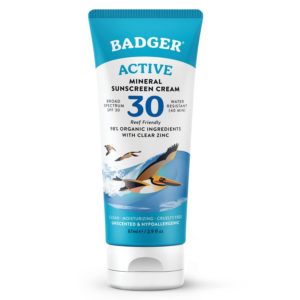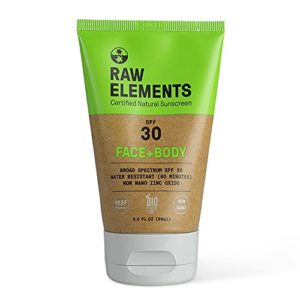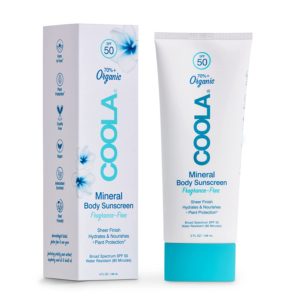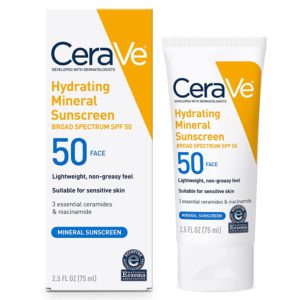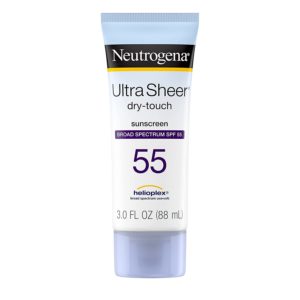5 Best Organic Sunscreens
Are you looking for a safe and healthy sunscreen to protect your skin this sunny summer season? With all the different types of skincare options out there, it can be hard to decide which one is best for you and your family. We understand the importance of protecting yourself from UV rays while also keeping our skin free from toxic chemicals. That’s why we reviewed the 5 best organic sunscreens that meet strict criteria in terms of safety and effectiveness against harmful UV radiation. Keep reading as we uncover each product’s pros and cons so you can make an informed choice on what will work best with your lifestyle!
Intro to Organic Sunscreens – Benefits and Features
As the summer sun beckons, it’s crucial to keep your skin protected from the harmful rays that can cause damage and accelerate aging. And what better way to do that than by slathering on a good sunscreen? But have you considered switching to an organic one? Organic sunscreens are formulated with naturally-derived ingredients, making them a safe and healthy option for all skin types. They do not contain harmful chemicals and provide broad-spectrum protection against UVA and UVB rays, thereby reducing the risk of skin cancer. Besides, organic sunscreens are eco-friendly and sustainable, so you’ll be doing your bit for the environment too. Ready to make the switch? It’s time to give your skin a healthy and safe summer experience with organic sunscreens.
Review of Top 5 Organic Sunscreens
In today’s world, it’s vital to protect our skin from harmful UV rays and pollutants. But are traditional sunscreens doing more harm than good? That’s where organic sunscreens come in, providing broad-spectrum protection while being environmentally friendly. Not only that, using an organic sunscreen can also help in preventing premature aging. But with so many options available in the market, it can be challenging to choose the right one for you. That’s why we’ve rounded up the 5 best organic sunscreens to make your decision-making process easy. From lightweight formulas to those that offer extra hydration and protection, these organic sunscreens will leave your skin healthy and glowing.
Our recommendations of the 5 best organic sunscreens
Badger SPF 30 Active Mineral Sunscreen
Taking care of your skin has never been easier than with Badger SPF 30 Active Mineral Sunscreen. This sunscreen not only protects your skin from the sun’s harmful rays, but it’s also healthy for your skin. The zinc oxide in the sunscreen acts as a physical barrier against the sun, reflecting the UV rays away from your skin. You won’t have to worry about harsh chemicals seeping into your pores with this all-natural sunscreen. So, whether you’re hitting the beach or just running errands outside, you can rest easy knowing that you’re giving your skin the protection it needs.
![]()
Raw Elements Eco Formula SPF 30+
Protecting our skin from harmful UV rays is not only important for our appearance but also for our overall health. That’s why Raw Elements Eco Formula SPF 30+ is a must-have for anyone looking for a healthy skin protectant. This mineral-based sunscreen not only shields your skin from the sun but also contains antioxidants that promote healthy skin. It’s made with organic and non-GMO ingredients, ensuring that nothing harmful is being absorbed into your skin. Plus, the lightweight and non-greasy formula make it easy to apply and perfect for all skin types. Invest in Raw Elements Eco Formula SPF 30+ for glowing, healthy skin year-round.
![]()
COOLA Mineral Sport Sunscreen SPF 50
As an athlete, you know how important it is to stay healthy and protect your skin from harmful rays when spending extended periods of time under the sun. That’s where COOLA Mineral Sport Sunscreen SPF 50 comes in. This sunscreen is specially designed for sports enthusiasts, providing you with long-lasting protection that won’t sweat off during a game or heavy workout. Not only does it protect your skin from the sun’s harmful rays, but it also nourishes it with healthy mineral ingredients. So, gear up and stay protected with COOLA Mineral Sport Sunscreen SPF 50.
![]()
CeraVe Hydrating Mineral Sunscreen Lotion SPF 50
Protecting babies from harmful UV rays is crucial to maintaining their healthy skin. That’s where CeraVe Hydrating Mineral Sunscreen Lotion SPF 50 comes in. With broad-spectrum protection, this sunscreen keeps little ones safe from both UVA and UVB rays. Its gentle formula is designed with babies’ delicate skin in mind, and is free from fragrances, parabens, and sulfates. So, whether you’re spending the day at the beach or just enjoying some time outside, this Sunscreen Lotion is a must-have for any parent who wants to keep their baby’s skin healthy and protected.
![]()
Neutrogena Ultra Sheer Dry-Touch Sunscreen SPF 50+
Protecting your skin from the sun’s harmful rays shouldn’t be a chore, and with Neutrogena Sheer Zinc Dry-Touch Sunscreen with SPF 50+, it’s not. Formulated with a light-weight texture, this sunscreen goes on smoothly and doesn’t leave behind a greasy residue. Not only does it provide powerful sun protection, but it’s also packed with anti-aging properties that help keep your skin looking youthful for years to come. Don’t let the fear of sun damage hold you back from enjoying the great outdoors – try Neutrogena Ultra Sheer Dry-Touch Sunscreen SPF 50+ today.
![]()
Wrap Up – Pros and Cons of Organic and Conventional
When it comes to choosing between healthy and conventional products, the debate can get heated. It’s important to weigh the pros and cons of each. On one hand, conventional products typically have longer shelf lives due to preservatives and other additives, but they may also contain harmful chemicals that can be detrimental to our health. On the other hand, organic products are often a better protectant against environmental toxins and chemicals, but they can also come with a higher price tag. Ultimately, deciding between the two options requires a careful examination of your values and priorities. If you prioritize leading a healthy and organic lifestyle, going all-in with natural products could be the answer for you.
Tips for Choosing the Right Sunscreen for You
When it comes to protecting your skin from harmful UV rays, choosing the right sunscreen is key. Not only do you want a product that will effectively shield your skin, but you also want to make sure it’s safe and doesn’t cause irritation. Consider opting for organic sunscreens that are free of harsh chemicals and loaded with natural protectants like zinc oxide and titanium dioxide. These mineral-based options are among the best for safeguarding your skin and are gentle enough for those with sensitive skin, so you can enjoy sunny days without worry.
Final Verdict – Which One Should You Buy and Why
When it comes to choosing the perfect product, it can sometimes feel like you have to make a life-altering decision. But fear not, when it comes to choosing between healthy, best protectant, and organic options, the final verdict is clear. Without a doubt, organic products are the way to go. Not only are they free of harmful chemicals, but they’re also better for the environment. Plus, they provide some serious protectant qualities, ensuring you get the most out of your purchase. So, the next time you’re faced with the choice of which product to buy, take the healthy and environmentally conscious route by opting for the organic option.
Q&A to Help
What is the healthiest sunscreen to use? For now, if you are concerned about health effects, the safest choice is a so-called “mineral” or “physical” sunscreen with zinc oxide or titanium dioxide, dermatologists say. Those are only sunscreen ingredients that the FDA says are “generally recognized as safe and effective.”
Is organic sunscreen better for you? Natural sun care products are usually much less likely to aggravate eczema and other skin conditions. If you have sensitive skin, or suffer from prickly heat, sun rash or another skin complaint, look for a fragrance-free natural sunscreen.
Is zinc oxide safe for skin? The ingredient doesn’t cause harm unless it’s swallowed or inhaled. Compared to avobenzone and titanium oxide, it’s cited as photostable, effective, and safe for sensitive skin.
What sunscreen does the FDA recommend? In general, the FDA recommends that you use broad spectrum sunscreen with an SPF of 15 or higher, even on cloudy days.
What should I look for in organic sunscreen? The key ingredients to look for in a natural sunscreen are zinc oxide and titanium dioxide. These mineral sunblock’s form a physical barrier on skin to reflect and scatter UV rays rather than absorb them. They are considered non-toxic, hypoallergenic and reef-safe.
What type of sunscreen is non-toxic? Mineral sunscreens tend to be a safer alternative to chemical sunscreens. It mainly contains naturally occurring minerals like titanium dioxide or zinc oxide. Sunscreen makers sometimes reduce these minerals to tiny particles to minimize the look of white cast in mineral sunscreens.
How do you know if sunscreen is organic? Essentially, they would use only ‘organic’ or ‘carbon-based chemicals’ in their ingredient list. It could have ingredients like oxybenzone, avobenzone, and octinoxate, which are all carbon-based, but not ingredients like zinc and titanium, because they are inorganic or not carbon-based.
Is there a natural sunscreen? Zinc Oxide and Titanium Dioxide Are the Only Natural Sunscreen Active Ingredients. As we mentioned before, zinc oxide and titanium dioxide are the only ingredients approved by the FDA to give your sunscreen a natural SPF. Zinc oxide and titanium dioxide are minerals, naturally found in the earth.
What sunscreen is safe to use everyday? For day-to-day use, pick a sunscreen with an SPF of at least 30. If you spend time outdoors, choose a product with SPF 60 or greater. In reality, most people do not use as much sunscreen as they should, and this higher SPF helps compensate for the reduced application.
What is the new carcinogen in sunscreen? Benzene, a known carcinogen, Has been found in some spray sunscreens, deodorants, and other products. Several products have been recalled because of the cancer risk.
Does coconut oil work as sunscreen? Coconut oil fails to prevent most of the damaging and harmful UVA and UVB rays that you’re exposed to when in the sun. While health bloggers posing as experts may tell you that it’s a good choice, all scientific studies point to one conclusion: it is not safe to use coconut oil as sunblock.
Is there a substitute for sunscreen? Aloe vera is effective in treating sunburns, redness, and dry skin. It can block around 20% of UV rays, making it a good option for after-sun care.
To conclude, it’s clear to see there are lots of organic sunscreens available on the market. Each product has a mix of pros and cons, so it’s important to determine which sunscreen is best for you based on your individual needs and preferences. After considering all 5 best organic sunscreens, the final verdict is that Neutrogena Sheer Zinc Dry-Touch Sunscreen with SPF 50+ is the best choice for its ease of use, light texture, and gentle protection. We have provided some helpful tips for choosing the right sunscreen for you, so now it’s up to you to take charge and make sure that you’re always adequately protected from harmful UV rays. What sunscreen did you choose? Let me know in the comments below. Thanks for reading!

